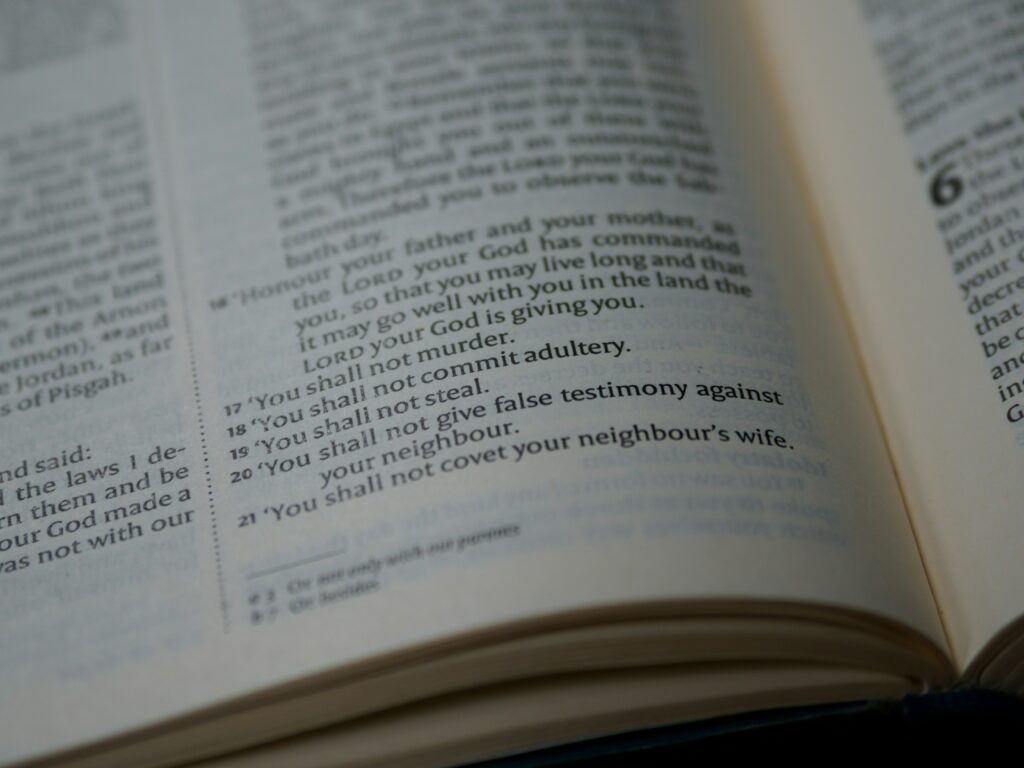Now then, if you will indeed obey My voice and keep My covenant, then you shall be My own possession among all the peoples, for all the earth is Mine; and you shall be to Me a kingdom of priests and a holy nation.’
Exodus 19:5-6, 17; Exodus 20:1-2
…
And Moses brought the people out of the camp to meet God, and they stood at the foot of the mountain.
…
Then God spoke all these words, saying,
“I am the LORD your God, who brought you out of the land of Egypt, out of the house of slavery.
The Contract
The setting is Mt. Sinai. God has led Moses and the people of Israel from their slavery in Egypt, through the Red Sea, to this place. Here He initiates a covenant with them, that He will be their God and they will be His chosen people. That covenant, like any contract, includes the rules by which both parties agreed to abide. Of about four chapters of contract conditions (Exodus 20-23), the most famous are the Ten Commandments below (See Exodus 20:1-17):
You shall have no other gods before Me.
One would think this point is obvious. After all, God had done miracle after miracle to lead them from slavery in Egypt. If your God had sent plagues to make the Pharaoh let you go, then parted the Red Sea when Pharaoh chased after you, then fed you with manna during the journey while guiding you via a pillar of fire…wouldn’t you prefer Him above any other possible gods? But these people were leaving a land where the Egyptians worshipped hundreds of gods and going to a land where the Canaanites worshipped many others. This gave abundant temptation to see Jehovah God as simply one among many, rather than the only one who gave evidence of really existing and having real power.
You shall not make for yourself an idol…
Many of those alternate gods were represented by idols, figures carved of wood, stone, silver, or gold. These idols were treated as gods themselves, as if the carved material was sentient and had its own power. Isaiah did the best job of satirically skewering these idols: “Half of it he burns in the fire…the rest of it he makes into a god…prays to it and says, “Deliver me, for you are my god.’” (Isaiah 44:14-17)
God deliberately avoided that by forbidding any kind of representation of Himself. He is too transcendent to be captured in any kind of image, anyway.
You shall not take the name of the LORD your God in vain…
If someone is solemnly affirming a fact, and is telling the truth, they don’t need to invoke God’s name to give their testimony more weight. If they are not telling the truth, they certainly don’t need to drag God’s name into their lie!
In that culture, a person’s name was not just a label. Their name brought into the conversation their entire person and character. God’s name, therefore God Himself, was not to be tossed around casually. His name was also not to be used as a catchall to cover actions and attitudes that otherwise were contrary to His commands.
Remember the sabbath day, to keep it holy...
To keep God — His presence, His power, His holiness, His goodness — fresh in memory, every seventh day was set aside as a time to especially remember and worship Him. This Sabbath day also was a gift to God’s people when all around them the standard was day-after-day of unceasing work. We today are so used to that refreshing day off that we forget it was an unheard-of innovation when God first commanded it.
Honor your father and your mother…
Moving on from how to relate to God, the commandments then focus on how to relate to one another, beginning with parents. The entire extended family — parents, children, grandparents, in-laws — was a unit that acted together, under the leadership of the family head (usually the father or prime breadwinning male). With marriages often being arranged without the bride’s wishes consulted, and several siblings and in-law’s sharing the same family unit, there was plenty of room for conflict. For the younger generations not to honor their elders would put a significant strain on the family, and from there on to the society at large.
You shall not murder.
There are several Hebrew words that could be translated as “kill” or “murder”. The shades of meaning from “accidental manslaughter” to “malicious murder” to “justified killing” are not particularly clear, any more than the simple word “kill” is in English. Modern translations are likely to use the English “murder” as their best interpretation of God’s intent in this passage.
Part of the reason for that interpretation is that elsewhere God gives specific instructions for times when it is appropriate to take human life (Exodus 21:12-17, 29; Exodus 22:18-20). Those times are not wanton; they are indicated for very serious situations only. Life is never to be taken casually, and certainly never with malicious intent.
Jesus went to the heart of this commandment in Matthew 5:21-26.
You shall not commit adultery.
Adultery is specifically the violation of a marriage vow, having relations with anyone other than one’s own spouse 1. In that case, it is not only sexually immoral; it is also breaking a contract, reneging on a promise. The Bible often uses the concept of adultery as a description of Israel’s breaking of their covenant vow of exclusive relationship with God (Jeremiah 3:6-10, Ezekiel 23:37-39, Hosea 1:2).
Jesus went to the heart of this commandment in Matthew 5:27-32.
You shall not steal.
The idea that a person’s possessions belong to them, and are not to be taken away, did not begin with this commandment. Some form of private property rights has been a given for almost as long as people have existed. Still, people have been stealing from one another for just as long. God says here that it’s wrong, and that His people are to respect one another’s “stuff”.
You shall not bear false witness against your neighbor.
God is Truth, so naturally His people are to deal honestly with one another. “False witness”, false testimony against another in court, is especially egregious. It undermines the entire purpose of a system designed to resolve disputes with fairness and justice.
You shall not covet your neighbor’s house…
God gives His people everything they need. As Jesus said, we are not to be worried about food and clothing since God will provide; instead, we are to focus on God’s kingdom and let Him handle the rest (Matthew 6:25-33). This commandment is that we be satisfied with that, and not always be looking around in envy at what He has given to others.
One of the best interpretations I’ve read for this last commandment refers to its placement after “Thou shalt not murder, commit adultery, steal, or lie”. This commandment says: “And don’t even want to!” 😁
The Contract Signed
The people enthusiastically agreed to this contract, twice: “All the words which the LORD has spoken we will do!”; “All that the LORD has spoken we will do, and we will be obedient!” (Exodus 24:3, 7) Then God called Moses up onto the mountain for more instruction, and “When He had finished speaking with him upon Mount Sinai, He gave Moses the two tablets of the testimony, tablets of stone, written by the finger of God.” (Exodus 31:18)
The Contract Broken
Moses was on the mountain for forty days. That was long enough for the people to forget all their history with God, and to break the contract they had just entered into:
Now when the people saw that Moses delayed to come down from the mountain, the people assembled about Aaron and said to him, “Come, make us a god who will go before us; as for this Moses, the man who brought us up from the land of Egypt, we do not know what has become of him.”
Exodus 32:1-6
..
Then all the people tore off the gold rings which were in their ears and brought them to Aaron. He took this from their hand, and fashioned it with a graving tool and made it into a molten calf; and they said, “This is your god, O Israel, who brought you up from the land of Egypt.”
Look back and count how many commandments were broken in that incident! I see at least two: They were worshipping an idol; and they were taking His name in vain. I really see three more: they were putting another calf-god before Him; they were committing adultery by breaking their vow with Him; and they were being dishonest by claiming to worship the God who had rescued them while really turning their back on Him.
The rest of the Old Testament is a history of the people continuing to behave like this. They betrayed God and broke their contract with Him, while He never broke His word. He first warned, then punished them. They begged to be allowed to return; He forgave them. Over and over and over again……
And before we condemn those idiot Israelites, let’s remember: We do the same thing!
A New Contract Promised
But God promised a better way in the future. He would replace the oft-broken contract with a new one that could never be broken. That is because the new contract would not depend on external actions. It would be based on internal knowledge of God, and He would write it Himself onto each individual heart.
Behold, days are coming,” declares the LORD, “when I will make a new covenant…
Jeremiah 31:31-34
…
“I will put My law within them and on their heart I will write it; and I will be their God, and they shall be My people. They will not teach again, each man his neighbor and each man his brother, saying, ‘Know the LORD,’ for they will all know Me, from the least of them to the greatest of them,” declares the LORD, “for I will forgive their iniquity, and their sin I will remember no more.”
The New Contract Delivered
Jesus is the embodiment of that new contract. He kept all the commandments perfectly, including the loving submission to His Father that is at the heart of them all. Then He took the consequences of the old, broken contract onto Himself.
And in the same way He took the cup after they had eaten, saying, “This cup which is poured out for you is the new covenant in My blood.
Luke 22:20
He said, “It is finished!” [Greek “teleō“, “paid in full”] And He bowed His head and gave up His spirit.
John 19:30
He offers His own righteousness as the basis of a new internal heart-contract. Once that gift is accepted, God sees me as fulfilling my side of the contract even though I definitely have not. Jesus fulfills it on my behalf.
Therefore if anyone is in Christ, he is a new creature; the old things passed away; behold, new things have come.
2 Corinthians 5:17, 21
…
He made Him who knew no sin to be sin on our behalf, so that we might become the righteousness of God in Him.
That’s why we call Him “Savior“!
Footnotes and Scripture References
- Other laws expand adultery and include other forms of sexual sin (Leviticus 20:10-21).


